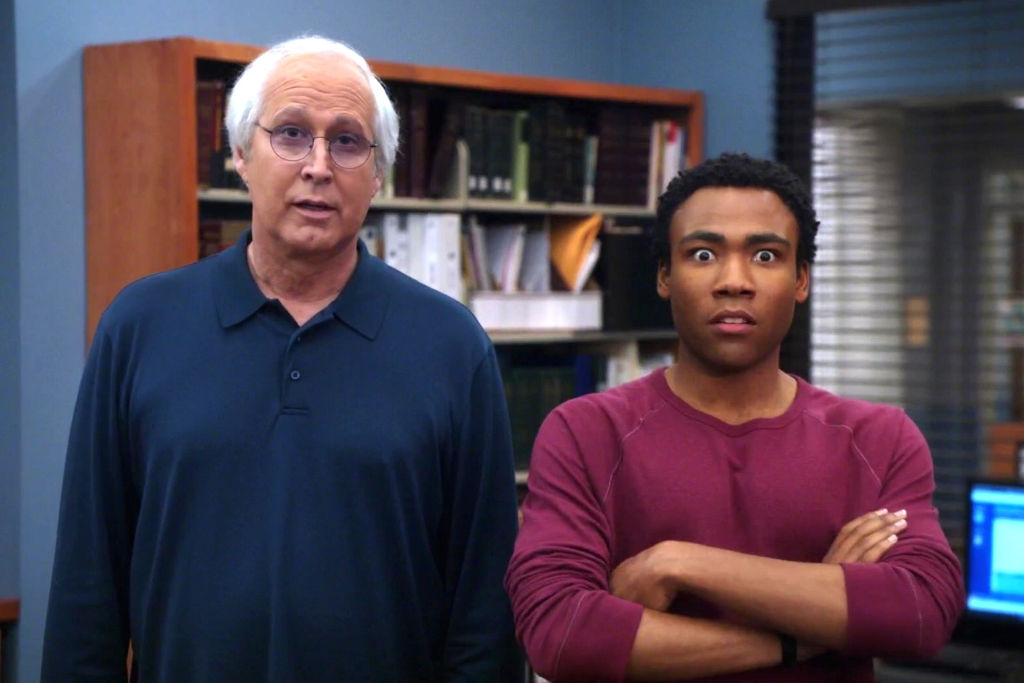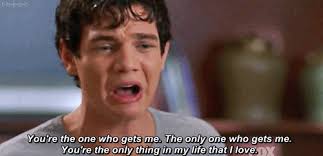Why We Give Our Favourite TV Shows A Free Pass Even When We Probably Shouldn’t
Why can some shows can get away with sexism, homophobia and racism, and others can’t?

Like learning that your significant other secretly watches The Big Bang Theory while you secretly listen to Taylor Swift*, confronting the flaws in your favourite things is a tough business. That’s probably why most of the time we just don’t do it at all.
I know this, because I have been avoiding a truth about my favourite TV show for a very long time. Gilmore Girls is a program that I have personally championed for at least ten years, to people who would listen and to people who rolled their eyes and said, “Urgh, is that that mother and daughter show?”. Yes, it is (is that a bad thing? Tell me why that is a bad thing) but it is also full of the kind of snappy writing that makes wannabe screenwriters weep and an ensemble cast that rivals Bridesmaids.
Gilmore Girls was funny, had a huge heart and provided a complexity of character that isn’t always offered to women on TV. And although it pains me, physically pains me, to write this I have to say it: Gilmore Girls is a little homophobic. The show makes jokes at the expense of gay people. Luke uses the word “poofy”. Lorelei says that two people of the same sex kissing each other “looks funny”. Jason says he can’t waltz because it looks, “a little gay”. Michel the concierge likes fancy suits and has a French accent, so you can only imagine the casual homophobia that is thrown his way. And these are just the instances off the top of my head. Gilmore Girls isn’t to blame for television’s careless attitude towards queerness, but it’s hard to ignore in a show that is so thoughtful about so many other things.
Now Gilmore Girls fans, please don’t come at me with hate. I am one of you! I don’t want to feel this way! I wish I hadn’t noticed! I pretended not to notice for a really long time. When it comes to pop culture we are taught to love things absolutely and if we dare to criticise something that is popular, we somehow ‘didn’t get it’ (a criticism unfairly lobbed at NPR’s Linda Holmes after she dared to say that she liked, but didn’t love the Breaking Bad finale. Grab your pitchforks, villagers!).

Why are some TV shows excused for certain things and others aren’t? Why is it that we expect some programs to be on another level of excellence and be representative of everyone, while other programs are allowed to be a slice of life? What pop culture crimes are we willing to ignore and does it depend on who is perpetrating them?
*Hey, it’s 2015 – listening to Taylor Swift isn’t a crime! The other thing is still a crime.
–
Introducing the Pop Culture Free Pass
By my definition – because I made it up – the Pop Culture Free Pass is a mystical award given to specific cultural products that transcend criticism. They belong to an exclusive league that humanity (re: the internet) has deemed beyond reproach because they do one or more things really, really well. There are probably a handful of shows that immediately spring into your mind and maybe even a friend who refuses to hear a bad word about their particular favourite thing. For now let’s focus on TV shows because you know, I don’t have all day to fend off the inevitable internet hate, hahahahahahahahahaha, oh gawd.
Google ‘Best Television Shows Of All Time’ and you’ll find endless listicles of television shows that have received the Pop Culture Free Pass. These are the television shows that if you dare to point out a flaw in their shiny, cable television-approved surface, you will then be digitally crucified. Because the shows are good enough at other things, these criticisms are seen as unnecessary meanness on par with sacrilege.
Doctor Who continues to have a strange relationship with female Companions who don’t have an identity outside of their male rescuer, but it’s also funny, inventive and consistently original. The Sopranos has issues in representing race and extreme violence, but it’s one of the most complex and challenging shows of all time. Breaking Bad has limited roles for women and people of colour. Game of Thrones has a rape problem. The West Wing has a woman problem. Friends was so scared that Joey and Chandler’s closeness be interpreted as gayness, that they had to mock their ‘bromance’ constantly. However, it is deeply fashionable to hurl criticism at these specific shows.
I’m not saying that these criticisms are valid or invalid, just that they exist and are continuously shouted down. I love Game of Thrones, but I know its depiction of sexual assault is appalling. Does that nullify everything else I love about it? Mainly it just breaks my damn heart. The Pop Culture Free Pass acts as a memory wipe, allowing you to Eternal Sunshine your discomfort and keep on enjoying the things that are great about these programs. If you can’t do that and instead tweet, “Hey was there a weird consent issue in this week’s Louis?”, then you will be accused of ruining a great show and taking all the fun out of it. You’re either with us or against us.
–
But it doesn’t always work
Even if they are of the same quality and have the same level of cultural cache, not all TV shows are afforded the Pop Culture Free Pass. Perhaps the most glaring example in recent memory is Girls: despite it being a show that confronted issues of gender, friendship, privilege, body image and consent in a way that no show had done in such a gutsy and unapologetic way, it was immediately criticized for the things it didn’t do over the things that it did.
When the first season wrapped academics like Roxane Gay were “disappointed” that Girls didn’t also interrogate issues of race (she was probably the kindest critic – it got pretty nasty). In an almost unprecedented move, Girls creator Lena Dunham actually listened to this criticism and attempted to rectify it immediately, despite her defenders arguing that it was not her job to be all things to all people.
Dunham herself later told Gay that this criticism hit her on a “gut level” and that is why she responded. But why was it Girls that bore the brunt of the racial diversity gap? Why did Lena Dunham have to get everything right, when others didn’t? Did anyone say it about How I Met Your Mother? Did people say it about Two and A Half Men? Some programs like Seinfeld relished in a “no hugging, no learning” attitude, but it seems that this option isn’t always available.
Or perhaps it’s gendered to a degree. Shows like Sex and the City are often dismissed for their ‘silly’ preoccupation with relationships and materialism and are thusly not recognized for their transgressive sexual politics. I personally dismissed Grey’s Anatomy for its obsession with landing ‘McDreamy’, until I realised that Shonda Rimes’ rich racial and sexual diversity outweighed the McWhatevers tenfold. Maybe because pop culture largely doesn’t take female-driven shows seriously, we tend not to cut them any slack ourselves.
For some of these programs, their ‘failings’ are representative of the time that they were made and thus they get a retroactive pass. However it is interesting when patterns are repeated for years and it only takes a single show for it to be unacceptable. Sometimes even when shows aren’t afforded a Pop Culture Free Pass, they still don’t give a damn – in recent seasons Mad Men’s quality has often been eclipsed by it apparent inability to represent race, but Matthew Weiner mostly ignores this.
–
So, can I ever enjoy TV again?
Um, duh. Of course you can! I’ve never understood the argument that interrogating and questioning entertainment means that you can’t enjoy anything, ever. I guess I don’t see how being critical of something means that you’re sucking the fun out of it. I know I’m not alone – when The New Yorker’s Emily Nussbaum identified True Detective’s misogyny, she perfectly encapsulated the tension of criticising art. “It’s no fun to be a killjoy, particularly when people are yelling, ‘Best show ever’,” she wrote. “It’s the kind of debate that tends to turn both sides into scolds, each accusing the other of being prudes or suckers”.

Pleading ignorance about issues of race, gender, or anything really, is something we can’t really do in 2015. But aiming to create cultural products that are sanitised in the hope that they won’t cause anyone offense, pretty much results in shitty TV. The Pop Culture Free Pass is boring because it eliminates conversation and healthy debate – how do we get better if we don’t talk about it? Being a fan of something shouldn’t have to be all or nothing, because you can love something despite its flaws. You’re actually allowed to say, “The Newsroom sure is elitist, but I still really love it”. We can and should turn a critical eye to the art that we admire.
Because of this I can acknowledge that it sucks when Gilmore Girls makes tasteless jokes, but I still like to watch it. I can be critical and adoring at the same time. I mean, shouldn’t we be?
–
Sinead Stubbins is a writer from Melbourne who has done stuff for Yen, frankie, Smith Journal and Elle. She tweets about Drake, Gilmore Girls and cheeseburgers at @sineadstubbins